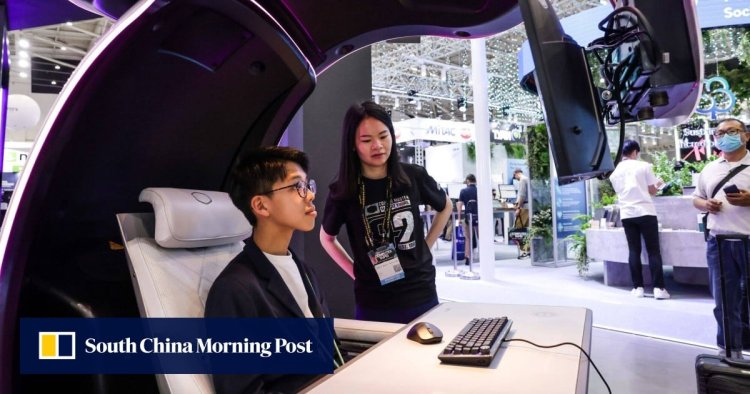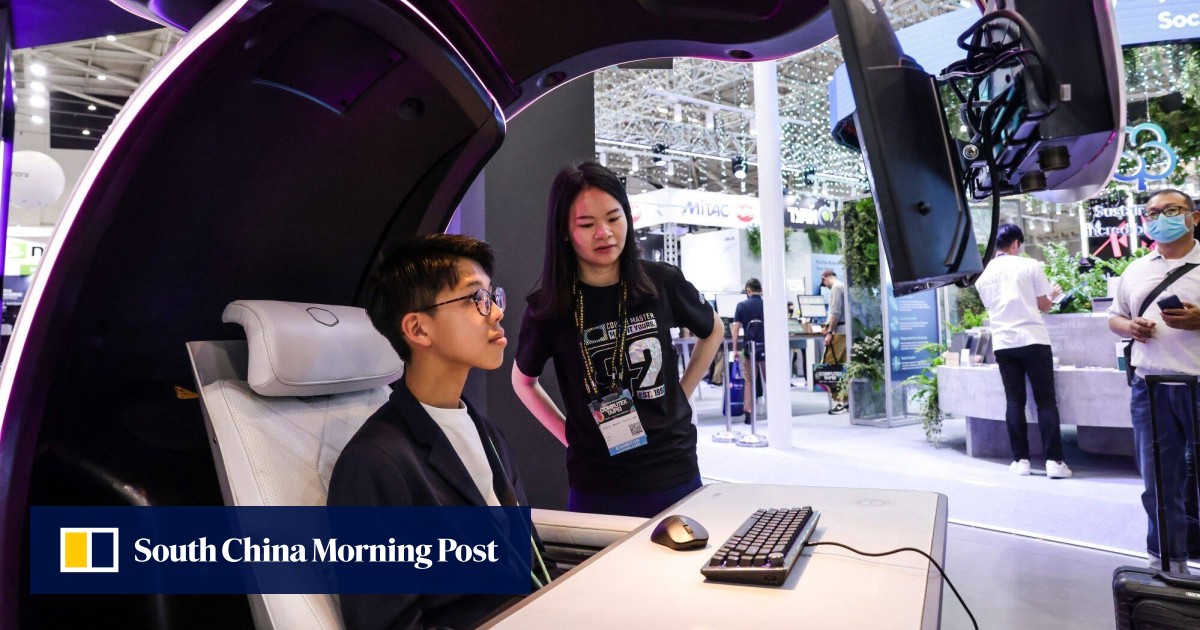Chinese tech firms, squeezed in Taiwan over politics, look to expand farther offshore
2023.05.31 23:00Chen Tao, the founder of Chengdu-based Micronet Union, is using the annual Computex Taipei tech show as the company’s first venue to tap overseas clients.His sparkly exhibition platform, prominently placed at the front of a major showroom, features stuffed pandas and monitor displays in simplified Chinese characters – both emblematic of the mainland.“Politics is one matter, economics is another,” Chen said, referencing Taiwan-mainland spats and the China-US trade dispute.The eight-year-old producer of network communications gear has now picked 35 countries – largely in Asia, the Middle East and South America – as targets for expansion, as it has sold all it can in its mainland China market.“Economic issues are the most practical,” he added.Taiwan trims 2023 GDP forecast, but AI, foldable phones and India offer supportMicronet Union was one of 83 mainland exhibitors among the 1,000-plus total at Computex, which was attended by tech heavyweights such as NVIDIA founder Jen


Chen Tao, the founder of Chengdu-based Micronet Union, is using the annual Computex Taipei tech show as the company’s first venue to tap overseas clients.
His sparkly exhibition platform, prominently placed at the front of a major showroom, features stuffed pandas and monitor displays in simplified Chinese characters – both emblematic of the mainland.
“Politics is one matter, economics is another,” Chen said, referencing Taiwan-mainland spats and the China-US trade dispute.
The eight-year-old producer of network communications gear has now picked 35 countries – largely in Asia, the Middle East and South America – as targets for expansion, as it has sold all it can in its mainland China market.
“Economic issues are the most practical,” he added.
Taiwan trims 2023 GDP forecast, but AI, foldable phones and India offer support
Micronet Union was one of 83 mainland exhibitors among the 1,000-plus total at Computex, which was attended by tech heavyweights such as NVIDIA founder Jensen Huang. The number of mainland exhibitors, however, was down sharply from 297 that attended the most recent fully in-person show in 2019.
Politically at odds, Taiwan has cut off formal dialogue with mainland China for seven years, and the two sides are allowing little travel, making it hard for on-site business exchanges. And as a result, mainland entrepreneurs are looking to the broader world market, even as they maintain a presence in Taipei.
Beijing sees self-ruled Taiwan as a breakaway province that needs to be reunited with the mainland, by force, if necessary. Tensions have shot up since a visit to the island by then US House Speaker Nancy Pelosi, which sparked mainland military drills near the island.
In the US, a staunch informal supporter of Taiwan, officials have barred transfers of high-end technology to China while courting investment from the Taiwanese tech sector that is known for advanced chips and makes up about 30 per cent of the economy.
Direct investments from the mainland in Taiwan fell from a historic high of US$349.5 million in 2013 to US$38.7 million last year, according to Taiwan Investment Commission data. Monthly trade data has also shown a steady decline in Taiwanese exports to the mainland.
Many mainland entrepreneurs are probably avoiding Taiwan, whether at Computex or at other venues, because they would find it “kind of weird” and “not so welcoming”, said Chen Yi-fan, an assistant professor of diplomacy and international relations at Tamkang University near Taipei.
Visas are hard to get for Taiwan, the professor said, even if events such as Computex allow mainland participation.
“It’s not just access,” said Joanna Lei, chief executive of the Chunghua 21st Century think tank in Taiwan, pointing to cross-strait tensions. “If I were a business leader, I wouldn’t come … I’d be worried for my safety.”
Taiwan intervention and US conflict among top worries for Chinese: poll
Some exhibitors sent local Taiwanese representatives to the show instead of trying to fly people in from the mainland.
Taiwanese and mainland firms still do business in tech manufacturing and R&D, Lei said, but they meet online or in third locations such as Singapore to reach deals. Taiwanese firms and trade groups still attend business forums in the mainland, she added.
Other mainland exhibitors said they came to this week’s Computex to scout for customers farther offshore than in Taiwan. Most are smaller to medium-sized developers of components for tech hardware.
Citaq, a Shantou-based maker of retail point-of-service hardware, got drop-ins from Western countries and India at its small Computex show space, according to overseas sales director Chen Fangkuang. He said the idea was to find clients, and politics had not come up.
“The people here are friendly,” the sales director said. “They’re just here to talk about tech hardware.”
Shenzhen-based Chipsea, a developer of USB hubs and haptic pads for PCs, could not send its mainland staff to Computex, but local reps attended the show in search of foreign buyers. Chipsea is especially trying to market new battery-management systems for laptops.
“We hope to establish relations with more manufacturers through [Computex] and do some technical exchanges,” company spokeswoman Lu Taotao said via WeChat.
Chinese companies across industries are trying markets abroad, especially around Asia, as they face competition from foreign-funded firms in China and become more aware of which countries have friendly legal environments for their investments, according to a 2021 study by the China Europe International Business School.
Some firms are looking offshore to avoid tariff hikes that came with the five-year-old China-US trade dispute, and to get around the US bans on technology transfers.
Chen Tao is keeping his head up, given his reliance so far in the domestic market and his focus on China-friendly nations for growth.
“We’re not too worried about that element,” he said.
What's Your Reaction?

















